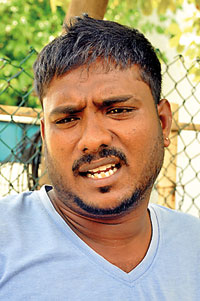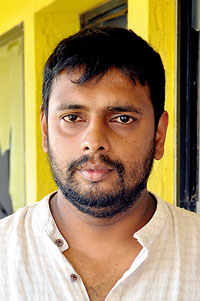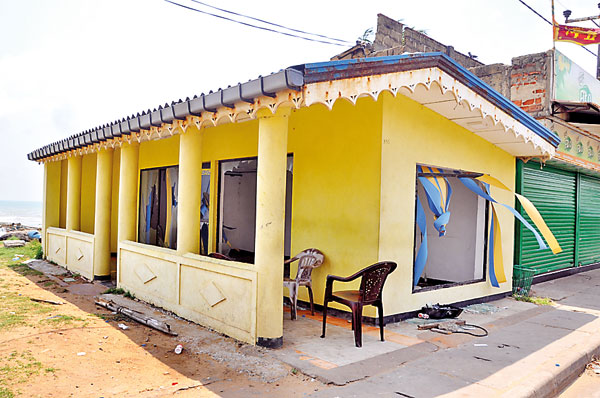News
An uneasy calm haunts Negombo

Pix by Priyantha Wickramarachchi
In Negombo, beneath the outward calm lies a simmering tension. Three weeks after the Easter Sunday bombings, the city is not at peace.
Catholic leaders say it will take a while, as well as reassurance from local Muslims, for their community to feel safe. “There is tension among the people,” said Father Clement, a priest from the Negombo deanery who asked to be identified by one name. “And fear about the future. There is no security. No certificate to say everything is cleared.”
Since early this week, mosques don’t broadcast prayers. The clergy said churches had requested them not to because it would feel like an affront to Catholics whose own prayer houses were locked up after the bombings. Negombo’s Muslims – who had nothing to do with the massacres – obliged. It is likely to be temporary.
Catholic prayer services only returned to some normalcy this week. But they are shorter and fewer in number; and the nervousness among worshippers is palpable. All but one gate in churches are closed and padlocked from the inside. Two police officers and members of parish vigilance committees are present throughout the day.

Sameera finds it hard to earn even Rs 100 a day
For Friday Muslim prayers, the Air Force was deployed around mosques to prevent violence. Clashes between Muslim and Sinhala groups at Pothupitiya on Sunday night had made everyone nervous. But the day passed without incident. There were no gatherings outside any of the mosques.
“Negombo is usually a crowded place,” said Father Clement. “Now it’s like a ghost town.” The shops are open but there are no customers. Traffic moves much quicker than usual. The roads empty out faster towards evening. And it is only those going to work and back who are out.
Wellaweediya, or Sea Street, which is Negombo’s tourism hotspot, is deserted. Hotel guests vanished soon after the bombings and haven’t returned. Restaurants are empty. Shops have no business. And several of the Muslim establishments that were targeted in the Pothupitiya “riot” remain closed.
“After April 21, I made one sale of Rs1,000,” said H A Prasanthi, a 48-year-old proprietor of a shop selling clothes for tourists. “Our customers all left. I have bank loans and vehicle leases to pay off. The overheads remain the same. But there is no business.” It was the same tale everywhere. From three-wheeler drivers to five-star hotels, everyone is suffering.
Not only has the economy taken a severe hit. Race relations are at their lowest. Prasanthi pointed to a Muslim-owned shop opposite hers. “We were very close to them,” she said. “Whenever they cooked something special, they would share it with us. And whenever we cooked something special, we would send it to them. But with all these swords and daggers that are being found in mosques, how can we trust them?”
“Now I have told my daughters not to eat anything even if they give it to us,” she admitted. “I bought material and Ayurveda products from Muslims. We are their customers. But why do mosques have swords and daggers?”
If the bombings were a tragedy, this breakdown of relationships – business and personal – compounds it. Muslims feel it too. They spoke of the unfairness of being branded as terrorists, or terrorist sympathisers, when they had nothing to do with the events of April 21. And they suspect that jealousy about their success in business might also be motivating some of the discrimination they are now experiencing. Latent biases are surfacing on all sides. The Easter Sunday bombings have hit the ordinary Muslim community hard.
Grief over human loss is still raw. Prasanthi cried as she spoke of her 38-year-old close friend, Chandima, whose two young daughters and husband died in the St Sebastian’s Church, Katuwapitiya explosion. “She could not attend their funeral because she was in hospital,” she said. “She asks what she has to live for now. She doesn’t want compensation. She wants her children back.”
Businesses that were identified by name are now called “Muslim shop” or “Sinhala shop” in Negombo. Sameera, a three-wheeler driver who complains that he can’t earn even Rs100 a day now, says he can’t trust Muslims anymore. The subject of swords and daggers comes up repeatedly. More even than the bombings, this appears to have left a lasting and damaging impression on Sinhala minds in Negombo.
There is no confidence in the Government and its ability to deal with terrorism or provide security. Special Task Force Commandant Senior DIG M R Latheef had promised churches to train members of their vigilance communities who would be checking the belongings of people entering premises. “He gave his mobile number,” said one Catholic priest, who did not wish to be named. “And said he would be happy to oblige if the Fathers request. But he doesn’t answer the phone.”
There were insufficient security checks in Negombo, they felt. “The Cardinal also said at the Bishops’ Conference to search shops and houses and mosques,” the priest said. “The Government is not taking anything seriously. They only want to be in power, thinking of the next election. People are angry with the Government.”
Father Clement felt that suspicions among communities will prevail for some time. But, he said, the Muslims could help by volunteering information about mosques belonging to various groups so that they could be investigated.
| What happened in Pothupitiya The clash started on May 5 on the border between a Muslim and Sinhala settlement in Pothupitiya, a coastal village. Locals insist it broke out over longstanding tensions about a hut, but escalated into an ethnic riot.  Farook Around 1pm on May 5, a group of young Sinhala men got drunk in a village tavern. Inside a hut on the beach another group of men were playing draughts. Adjoining was their three-wheeler park. This hut has been a problem for a while, said Nirasha, who owns a small grocery store on the border. “It’s an unauthorised structure built with Muslim political patronage, and unwanted things were happening there throughout the night,” she claimed. But the clash on Sunday was triggered by the inebriated men. They walked up and down a few times, shouting “ISIS” and making derogatory remarks. This was despite there also being some Sinhalese men in the hut playing draughts at the time, according to a woman who lives in a house on the beach. Then, unexpectedly, one of the drunken men took up the draughts board and landed it on the head of a Muslim man in the hut before they all ran back towards the Muslim settlement. Mohamed Farook Shiyam Mohamed, 36, was in his minimart, which is also on the beachfront. There have been tensions over his building, too. The Sinhalese claim it was built illegally on Coast Conservation Department land – like the hut – with the support of a local politician named Harees. Farook is Harees’s nephew. He heard the fight break out and called his uncle. Nirasha and others agree that measures were quickly taken to settle the brawl. “It was on the ‘shape side’,” said Farook. But, then, the rocks started flying. There is no consensus on where they came from first. The Muslims say they were flung from the Sinhala side. The Sinhalese claim the opposite. Some shattered the window panes of Farook’s shop. People from other areas of Negombo rapidly started streaming towards Pothupitiya, wielding poles and sharp implements. Muslim shops in other streets were also targeted. Some remain closed. “I am from this area and I know what has been going on,” said Nirasha, 49. “There were problems for a long time over these unauthorised structures and the three-wheeler park. The Sinhalese felt there were unwanted activities going on and there have been disputes on and off. This time, it escalated because people came from outside.” Nirasha says if a fight breaks out in future, the outcome could be worse. That is also because, she explained, “a certain class of people live here”. “Those with greater understanding would not have become this agitated,” she said. Farook expressed hurt. “We lived in harmony before,” he said. “Sinhalese people came to my shop and would even take loans from me. We want to live in peace. But if they come to beat us in future, we will also hit back.” | |
 |

